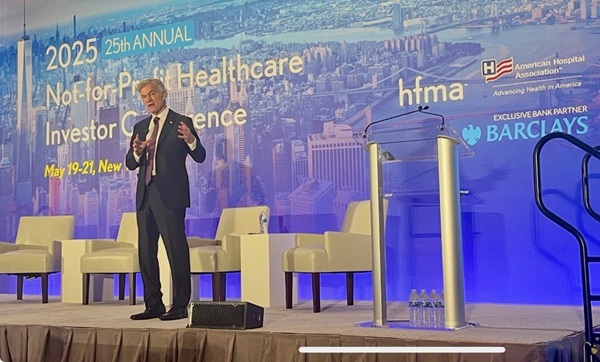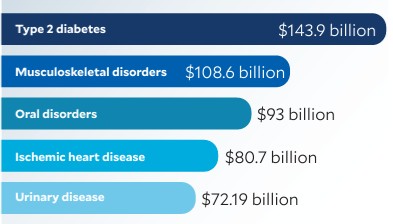News Briefs: Dr. Oz describes a reimagined healthcare ecosystem at HFMA event
A rapid acceleration of digital healthcare applications will be central to the looming transformation of the U.S. healthcare system, according to Mehmet Oz, MD, administrator of CMS.

Photo by Brad Dennison
Oz spoke at the annual Not-for Profit Healthcare Investor Conference, sponsored by HFMA, Barclays and the American Hospital Association. He sought to explain why sweeping, systemic changes are necessary.
“I came to recruit you to help,” Oz said. “The magnitude of the challenge that we’re facing is scary, but you never want to waste a crisis. This is a generational opportunity for people to come and help play a role in whatever way possible.”
The day is fast approaching, conceivably within a year, when Medicare beneficiaries get messages on their phones prodding them to take action on a basic health or lifestyle issue, Oz said. That interaction also will allow beneficiaries to describe symptoms or concerns to a customized AI avatar, tailored to a beneficiary’s specific demographic and circumstances.
CMS recently sent healthcare stakeholders a request for information on ways to create such a technology ecosystem, Oz noted.
House passes budget reconciliation bill with implications for Medicaid coverage
A sweeping federal policy bill that includes major changes to Medicaid is halfway toward becoming law after narrow passage by House Republicans.
The 215-214 partisan vote May 22 sent the bill to the Senate, where some Republicans have talked about making changes, including by tempering some of the healthcare cuts.
Estimates by the Congressional Budget Office suggest the House-passed cuts to projected Medicaid spending would save $625 billion but result in a loss of coverage for 10.3 million beneficiaries over a decade.
Key Medicaid changes would include a work requirement taking effect in 2027 for able-bodied adults without children, along with stricter caps on future state-directed supplemental payments to providers. Provider taxes that help fund those payments also would face new restrictions.
Provider advocates say the changes to supplemental funding and taxes would intensify the challenge of finding the resources to treat patients. Those funding constraints could be “a death knell to critical hospital services and entire communities’ access to care,” the Federation of American Hospitals said in a written statement.
The 10 states that have not expanded Medicaid would be allowed a 10% higher cap on state-directed payments.
New reconciliation bill would reduce ACA marketplace insurance enrollment
The budget reconciliation bill passed by the House on May 22 attempts to generate savings by tamping down Affordable Care Act (ACA) marketplace insurance enrollment.
One key change in the bill would happen simply by omission: There is no provision to maintain the enhanced subsidies that have been available to cover plan premiums for low-income enrollees since 2021 but are expiring at year’s end.
The Urban Institute, a left-leaning think tank, has estimated a net enrollment loss of 4 million if the subsidies are eliminated.
The legislation would codify and expand on a Trump administration proposed rule that was drafted to curb marketplace enrollment through what are described as program-integrity measures (e.g., a significant contraction of special enrollment periods). CMS in the proposed rule estimated enrollment would drop by between 790,000 and 2.1 million over four years via various technical changes.
Medicare’s FY26 inpatient hospital proposed rule includes a restrained payment update
The Trump administration’s first set of Medicare proposals establishing inpatient payment rates continued what hospital advocates describe as a long-term trend in which the annual update is lacking.
A 3.2% increase in the market basket would be reduced by a 0.8% statutory productivity adjustment, according to the FY26 proposed rule released April 11. Hospitals that meet requirements related to quality reporting and electronic health record use would average a 2.4% net increase in operating payments over FY25.
“While CMS’s proposed update reflects the inflation formulas established by law, the reality is that patient care still faces the twin problems of hangover cost increases from hyperinflation and the cumulative effect of inadequate payment over time from Medicare and Medicaid,” the Federation of American Hospitals said in a statement.
U.S. healthcare spending by health condition, 2019

Source: Dieleman, J.L., et al., “Tracking U.S. healthcare spending by health condition and county,” JAMA, Feb. 14, 2025.
Court rules against drug companies on the question of a 340B rebate model
Hospitals hoping to avoid having to use a rebate model in the 340B Drug Pricing Program received good news in court recently.
A federal judge issued a May 15 written opinion stating that the Health Resources and Services Administration (HRSA) was within its rights to deny four drug manufacturers unilateral authority to implement a rebate model for providing 340B discounts. Hospitals and their advocates have expressed concern that rebate models would create a significantly higher administrative burden while adversely affecting cash flow.
The case combined lawsuits brought by Bristol Myers Squibb, Eli Lilly, Novartis, Sanofi and a technology company against HRSA during the Biden administration. Although the Trump appointed judge mostly ruled for the government, she also backed Sanofi’s claim that the agency acted arbitrarily and capriciously in stating that the company’s rebate plan would violate the 340B statute.
With the legal issues settled barring an appeal, 340B stakeholders still need to wait and hear from the Trump administration regarding the permissibility of a rebate model.
Per a filing with the court, HRSA intended to issue guidance on the rebate model concept within 30 days as of May 2.
Latest on the BCBS settlement as date of final approval nears
Nearly 15,500 healthcare providers are known to have withdrawn from the record-setting Blue Cross Blue Shield antitrust settlement, retaining the option to pursue separate litigation.
The number was listed in an April court filing as the parties move toward a July 29 hearing at which the presiding court is scheduled to consider final approval of the settlement.
The same date is the deadline for settlement participants to file claims for a share of a settlement fund that totals roughly $2 billion after subtracting fees.





